I love artichokes, and it is quite difficult to find them here in the UK... a few years ago, when staying at Bangors Organic in Cornwall, Gill served them for dinner: whole, just steamed (or boiled?) with a butter serving - de-li-cio-us! So, before leaving, I was eager to ask for some to take away, I mean, we were ready to buy some! When we went back more recently, Neil recognised us as the people who asked for the artichokes - he said he was surprised by the request at the time! I like to think that that episode might have contributed to spark off the idea to open an organic farmers' market at their place, The Big Green Shed, which they have inaugurated this month.
 Fast forward to now, here are my artichokes, just back from the plot: don't they look appetizing?
Fast forward to now, here are my artichokes, just back from the plot: don't they look appetizing?If that was a new veg for me, I'd feel intimidated how to approach it... how do you pick, clean and eat? Any safety concerns?
I was like that with gooseberries when I first saw them... now I love them, thorns and all! I was not yet entirely comfortable with artichoke in the field, either: when are they ready to pick? Now I know: the leaves need to be starting to come apart.
For those that have never cooked with artichokes, I have asked Gianfranco to take some pictures of me cleaning them: nobody should be put off such a lovely veg! They are fairly quick to deal with when you know how: it took me 48 mins from basket to plate, with taking pictures and all. Pictures from all steps are on Flickr, I copy here the essential ones to keep it shorter.
First thing to know, is that artichokes oxidise and go unappealingly brown as soon as cut, unless kept in acidic conditions, which in my family we do by washing and keeping in water in which lemon has been squeezed.
Second thing to know if you do not want to be put off from ever eating artichokes again is: the tasty bit is the heart, all the rest is basically a way for the plant to discourage pests eating it (humans as well) you have to be absolutely ruthless with what you take away - everything that feels like cutting into cardboard, anything spiny and the choke need to go.
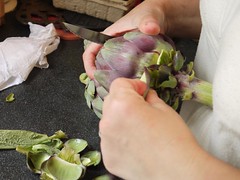 I start by pulling out the external leaves. The smallish ones are composted, while the bigger ones can be used later - take care to keep them whole at the base. As soon as they are off, put in lemon & water. Everything that is green at the base is off, you have to be left with yellow and red.
I start by pulling out the external leaves. The smallish ones are composted, while the bigger ones can be used later - take care to keep them whole at the base. As soon as they are off, put in lemon & water. Everything that is green at the base is off, you have to be left with yellow and red.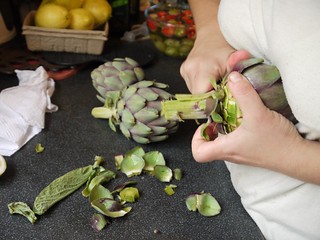 If the stalk is not too woody, you can keep it on for cooked recipes, but have to peel it (up to the first leaves' remains). It's not too good in raw recipes, so you can keep it for later together with the leaves.
If the stalk is not too woody, you can keep it on for cooked recipes, but have to peel it (up to the first leaves' remains). It's not too good in raw recipes, so you can keep it for later together with the leaves.Take the top of the leaves off. I have left too many tougher leaves (see the greenness there?): always tempted to keep as much as possible - this is the time to take them off, really. Also, you have to decide how high up to cut depending on how tough those internal leaves are.
Half the heart and then quarter it.
Remove the choke. There is a line where the blade goes in easily at the bottom of the fluffy choke. Do not cut into the flesh, that's what you eat! Take away all the internal spiny leaves too: they look deceptively innocuous. Get them in the water & lemon asap to avoid discolouration.
Ready for eating!
I love them raw, sliced with salt, extravergin olive oil and lemon. Also delicious sliced and deep fried in a batter of egg, dusting of flour, lightly salted: OH granny's Easter speciality.
This time, I braised them in lemon juice after lightly frying with garlic & chilli. Stirred in a few fresh basil leaves, chopped. Et voila!
I kept the tough leaves in acidic water until next day & boiled until tender: the fleshy bit goes green and you can see veins. Holding the leaf at the top, you can dip them in butter and scoop out the flesh with your teeth (guilty pleasure, that's how I ate them at Gill's back then).
My aunty, more refinedly, scoops them out with a spoon to make puree.
How will you cook them?
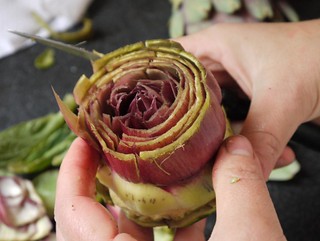
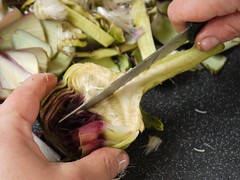
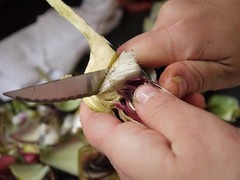
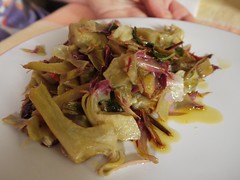
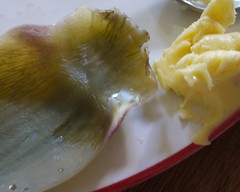
If you just want the stalks/hearts, just pop the whole chokes in a pan. Cover in boiling water & weight down with a plate or bowl. Cover & simmer for 10-15 mins until the heart is tender to the point of a knife. Then all the leaves come off dead easy.
ReplyDeleteMy other fave is to prep as you have done and then saute in olive oil with lemon thyme and bacon. Delish - good blog BTW :))
That must have been how Gill cooked it, it was so tender :) Oh, and I think I have some lemon thyme now, haven't I? :)
ReplyDelete